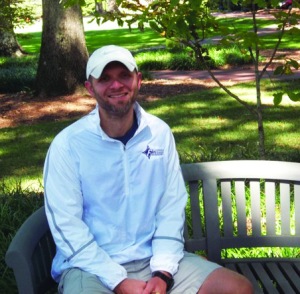
Photo courtesy of Jonathan Painter
He is a philosophy of religion, trout fishing and FSU football enthusiast. He made some pit stops at Sewanee, Vanderbilt and Hendrix before settling down at Furman. Five years later, Aaron Simmons, Ph.D. is an associate professor of philosophy at Furman University. The Paladin sat down with Simmons to get to know him on a more personal level.
Tell us a little bit about what you do here at Furman.
My main areas of teaching at Furman are in contemporary philosophy (19th and 20th Century). In most of my research I generally try to think about God, faith and religious existence in a postmodern world. More broadly, I try to live into the expectations of liberal arts culture by being involved widely and relationally across campus. Especially, I work frequently with athletics, admissions and alumni relations.
How did you become a philosophy professor?
I started college wanting to study physics, but I soon realized that the questions that excited me required too many years of mathematics. I tried a music major for a while, but as a professional drummer I found I was canceling gigs in order to study music to get gigs like the ones I had canceled. So I did what any smart college student does: went to Europe. After studying in Europe, I went to grad school to study the humanities (though I really just went to FSU to cheer for Seminole football). At FSU and then Vanderbilt, I discovered that philosophy allowed me to ask the same questions as physics, but from an existential perspective rather than a mathematical one. I also expected the academic life to allow me to fish for three months every summer. Unfortunately, I did not have a good grasp on what getting tenure means. Hopefully I can fish more now.
What is the coolest part of being a philosophy professor, or just working in academia in general?
I get to spend my life thinking about the questions that matter to me, and hopefully motivating concern for these questions among others. Not a bad way to spend one’s time.
How did you end up at Furman?
My family is from the Southeast, and so ultimately I wanted to end up at a selective liberal arts college, with proximity to family, trout rivers and FSU football games.
Were there any teachers or mentors who really helped you become who you are today?
As an undergrad I only took introduction to philosophy, but that course cultivated in me an interest in questions that matter. At FSU, I learned what it looked like to live the life of the mind with vigor. At Vanderbilt, I learned not only how to be a professional, but how to care about making a contribution to my discipline.
Tell us about your some of your best experiences in college/grad school.
The things I remember most from college happened outside the classroom. In grad school things were more serious, but even there it wasn’t the classroom that stuck out. It was the conversations after class, at the pub, that had more impact on me. College is a time to figure out not only what one thinks, but also who one wants to become.
In your discipline, what is your specific passion or area of interest?
I am really interested in how religious belief and existence is possible after what has been called the “death of God.” For me, this postmodern framework does not foster a lack of religious existence, but raises the stakes of what religious existence requires.
Are you currently working on or have you published any research/books/papers/other projects?
Yes. I’ve published quite a bit. Currently, I am working on a variety of projects during my sabbatical dealing with topics including contemporary phenomenology, Christian philosophy, Kierkegaard, and postmodern epistemology.
What kind of music do you like listening to?
I like conscious rap and metal. My favorite band in 311, which really doesn’t fit in either category, however.
Do you have any words of wisdom or life/academic advice to the Furman student community?
I genuinely try not to give advice, but instead to invite people to inhabit their own existential freedom. In other words, you are responsible for choosing what you decide will matter and what will occupy your life. These are decisions that one must make for oneself, but having good conversation partners matters.